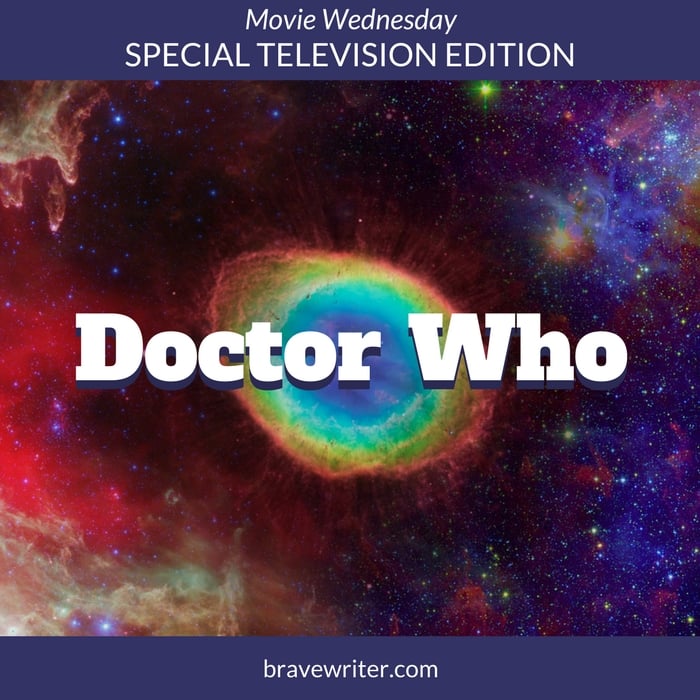Movie Wednesday SPECIAL TELEVISION EDITION: Doctor Who

by Amy Frantz, Brave Writer alum
Rose Tyler is a normal 19-year-old young woman, she works a normal job, and has a normal boyfriend and a normal mother. Until one night after her shift ends, Rose is attacked by plastic mannequins animated by a strange power. Rose is saved by the mysterious “Doctor” and her normal life suddenly turns upside down. The Doctor is over nine hundred years old, he’s the last of a species called Time Lords, he can regenerate when he dies, and he has a ship that can travel anywhere in time and space, is bigger on the inside, and looks like a police telephone box. The Doctor offers to take Rose with him on his travels and the two embark on an adventure through the stars filled with laughter, heartache, and more than a few monsters.
[This post contains Amazon affiliate links. When you click on those links to make purchases,
Brave Writer receives compensation at no extra cost to you. Thank you!]
The original Doctor Who series began airing on the BBC in 1963 and ran until 1989 when it was taken off air. A movie, a line of books, and audio dramas were produced in the interim, but it wasn’t until 2005 that the show returned to television. Rebooted by new headwriter Russell T. Davies and executive producer Julie Gardner, starring Christopher Eccleston as the Doctor and Billie Piper as his companion Rose, Doctor Who leaped into the 21st Century (and across the pond) with a bang and resumed its place as a television staple.
The show has since changed headwriters twice and five different actors have played the titular role of the Doctor since the reboot, with Jodie Whittaker as the latest regeneration of the iconic Time Lord and the first woman to ever take on the role. But it all began in 2005 with Eccleston and Piper…and some very ill-behaved plastic dummies.
To most American ears, Christopher Eccleston’s Doctor having a Northern accent might not register. But within Doctor Who it was quite a big deal for the Doctor to speak in anything other than Received Pronunciation. What is Received Pronunciation? You may have also heard it called “the Queen’s English” and it is considered to be the “standard form” of “educated” southern British English. Eccleston speaking in a Northern accent opened the door for contemporary Doctors to use different accents outside of “standard speech,” such as Peter Capaldi’s Scottish accent.
Discussion Questions
- In the reboot, an effort was made to make the Doctor/Companion relationship on more equal footing, instead of the kinds of “paternal” relationships previously shown. Do you think they succeeded? Why or why not?
- Rose Tyler decides to run off with the Doctor and travel with him through space and time. If the Doctor showed up and made you the same offer, would you accept? Explain your answer.
- In the third episode, Rose and the Doctor meet Charles Dickens. If you could travel back in time, who would you want to meet and what would you do if you did?
- If you have watched multiple seasons of Doctor Who, who is your favorite Doctor and why?
Additional Resources
An Adventure in Space and Time – A dramatized look at the creation of the original TV show
Official Doctor Who YouTube Channel [spoilers for recent seasons; make sure you’re caught up before exploring]


















